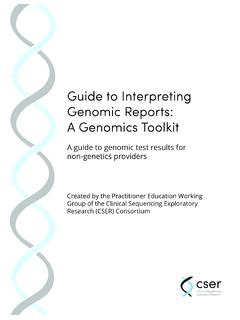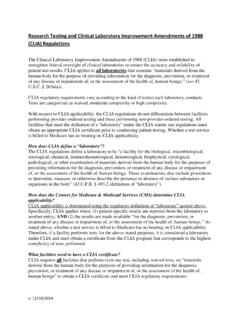Transcription of The Genetic Information Nondiscrimination Act of 2008 ...
1 Department of Health and Human Services (HHS). GINA . The Genetic Information Nondiscrimination Act of 2008. Information for Researchers and Health Care Professionals April 6, 2009. The Information presented in this fact sheet is intended for general informational purposes only. While this fact sheet does not cover all of the specifics of GINA, it does provide an explanation of the statute to assist those involved in clinical research to understand the law and its prohibitions related to discrimination in health coverage and employment based on Genetic Information . The Information should not be considered legal advice. In addition, some of the provisions discussed involve issues for which the rules have not yet been finalized, and this Information is subject to revision based on publication of regulations.
2 What is GINA? The Genetic Information Nondiscrimination Act of 2008 ( 110-233, 122 Stat. 881) 1 , also referred to as GINA, is a new Federal law that prohibits discrimination in health coverage and employment based on Genetic Information . The President signed the act into law on May 21, 2008. The section of the law relating to health coverage (Title I). generally will take effect between May 22, 2009, and May 21, 2010. 2 The sections relating to employment (Title II) will take effect on November 21, 2009. GINA requires regulations pertaining to both titles to be completed by May 2009. How does the Federal law affect state laws? GINA provides a baseline level of protection against Genetic discrimination for all Americans.
3 Many states already have laws that protect against Genetic discrimination in health insurance and employment situations. However, the degree of protection they provide varies widely, and while most provisions are less protective than GINA, some are more protective. All entities that are subject to GINA must, at a minimum, comply with all applicable GINA requirements, and may also need to comply with more protective State laws. 1. 2. The effective date of the insurance provisions is not the same in all cases because for group health plans, Title I will take effect at the start of the plan year beginning one year after GINA's enactment. Because some health plans do not designate their plan years to correspond to a calendar year, there will be variation among plans as to when Title I takes effect for the plans.
4 However, for individual health insurers, GINA will take effect May 22, 2009. What will GINA do? GINA generally will prohibit discrimination in health coverage and employment on the basis of Genetic Information . GINA, together with already existing Nondiscrimination provisions of the Health Insurance Portability and Accountability Act, generally prohibits health insurers or health plan administrators from requesting or requiring Genetic Information of an individual or the individual's family members, or using it for decisions regarding coverage, rates, or preexisting conditions. The law also prohibits most employers from using Genetic Information for hiring, firing, or promotion decisions, and for any decisions regarding terms of employment.
5 The statute defines Genetic Information ' as Information about: an individual's Genetic tests (including Genetic tests done as part of a research study);. Genetic tests of the individual's family members (defined as dependents and up to and including 4th degree relatives);. Genetic tests of any fetus of an individual or family member who is a pregnant woman, and Genetic tests of any embryo legally held by an individual or family member utilizing assisted reproductive technology;. the manifestation of a disease or disorder in family members (family history);. any request for, or receipt of, Genetic services or participation in clinical research that includes Genetic services ( Genetic testing, counseling, or education) by an individual or family member.
6 Genetic Information does not include Information about the sex or age of any individual. The statute defines Genetic test' as an analysis of human DNA, RNA, chromosomes, proteins, or metabolites that detects genotypes, mutations, or chromosomal changes. The results of routine tests that do not measure DNA, RNA, or chromosomal changes, such as complete blood counts, cholesterol tests, and liver-function tests, are not protected under GINA. Also, under GINA, Genetic tests do not include analyses of proteins or metabolites that are directly related to a manifested disease, disorder, or pathological condition that could reasonably be detected by a health care professional with appropriate training and expertise in the field of medicine involved.
7 How will the law be enforced and what are the penalties for violation of the law? The law will be enforced by various Federal agencies. The Department of Labor, the Department of the Treasury, and the Department of Health and Human Services are responsible for Title I of GINA, and the Equal Employment Opportunity Commission (EEOC) is responsible for Title II of GINA. Remedies for violations include corrective action and monetary penalties. Under Title II of GINA, individuals may also have the right to pursue private litigation. What won't GINA do? GINA's health coverage non-discrimination protections do not extend to life insurance, disability insurance and long-term care insurance.
8 GINA does not mandate coverage for any particular test or treatment. 2. GINA's employment provisions generally do not apply to employers with fewer than 15 employees. For health coverage provided by a health insurer to individuals, GINA does not prohibit the health insurer from determining eligibility or premium rates for an individual based on the manifestation of a disease or disorder in that individual. For employment-based coverage provided by group health plans, GINA permits the overall premium rate for an employer to be increased because of the manifestation of a disease or disorder of an individual enrolled in the plan, but the manifested disease or disorder of one individual cannot be used as Genetic Information about other group members to further increase the premium.
9 GINA does not prohibit health insurers or health plan administrators from obtaining and using Genetic test results in making health insurance payment determinations. What is the status of regulations to implement GINA? The law requires regulations by May 2009. The Department of Health and Human Services (Centers for Medicare & Medicaid Services (CMS) and the Office for Civil Rights), the Department of Labor, the Department of the Treasury (the Internal Revenue Service), and the EEOC are currently working on the regulations. The Department of Labor, the Department of the Treasury, and CMS put forth a Request for Information about issues relevant to some of the health coverage provisions in Title I on October 10, 2008, which closed on December 9, 2008.
10 3. Is GINA retroactive? GINA will not be retroactive, , it cannot apply to acts or omissions that occurred prior to GINA's effective dates. However, once GINA takes effect, it will prohibit certain uses of Genetic Information in connection with health coverage and employment, no matter when the Information was collected. For example, a health insurer that has been collecting or using Genetic Information for underwriting would need to change its business practices once GINA takes effect. Likewise, certain employers requiring Genetic tests or family history Information from employees or prospective employees will no longer be able to do so after GINA takes effect and will be prohibited from discriminating based on any Genetic Information that they had already collected.







